Posted by Janine Griffiths
How to find care homes for elderly couples

Many couples dream of growing old together and spending their twilight years enjoying each other’s company.
However, the process of moving into a care home can often result in elderly couples being separated, which can cause distress to both parties.
This doesn’t have to be the case however. It is possible to find care homes for elderly couples that will allow you to either share a room or have separate suites, depending on your preferences.
In this blog, we’ll explore how to find care homes that cater to elderly couples and key factors to consider when deciding to move together.
Why move as a couple?
For elderly couples, moving to a care home together offers emotional comfort and practical benefits.
Staying together allows partners to maintain their familiar bond, providing stability during what can be a challenging transition.
Sharing routines and offering mutual support helps preserve a sense of normalcy, while companionship can significantly ease feelings of loneliness or anxiety.
Many care homes now recognise the value of keeping couples together, offering tailored options such as double rooms or adjoining suites. This growing focus ensures that couples can continue their shared journey, even when their care needs change or differ.
When it might be suitable to move as a couple
Moving to a care home for elderly couples can be a suitable option in several scenarios. For instance, if one partner’s care needs become too complex to manage at home, professional support may be essential.
Similarly, when both partners face declining health or mobility, a care home can provide a safer and more supportive environment. In some cases, living at home together may no longer be practical or safe due to challenges like falls or managing daily tasks.
It’s important to recognise when additional care is needed, even if one partner requires more support than the other. Many care homes are equipped to provide personalised solutions for couples with differing needs, ensuring both receive the appropriate level of care. Consulting healthcare professionals or care advisors can help assess the right time to move and identify options that allow couples to stay together while receiving the care they need.
Benefits of moving as an elderly couple
Moving to a care home together offers a range of benefits that can significantly improve the quality of life for elderly couples.
One of the main advantages is emotional stability; staying together helps alleviate feelings of isolation and anxiety, providing both partners with reassurance and comfort during a major life change.
Below are some of the other main benefits of moving into care homes for elderly couples:
Financial benefits of moving as a couple
When elderly couples move to a care home together, the financial process can often be more straightforward and affordable due to sharing the costs. Some care homes offer joint pricing for couples, which can reduce costs compared to having two separate placements.
By sharing a room or adjoining suites, couples may save on accommodation and care fees. Additionally, working with financial planners or care advisors can help couples explore available funding options, such as local authority support or private funding, making the financial aspect of the transition easier to manage.
Improved mental health
Moving into a care home together offers significant emotional benefits. Staying together provides reassurance and stability, helping to reduce the stress and anxiety associated with this life change.
Having each other for support in a new and unfamiliar environment creates a sense of security. By maintaining their bond, couples can experience emotional continuity, which plays a crucial role in safeguarding mental health, especially when dealing with declining physical health or increased care needs.
Reassurance and peace of mind
Moving to a care home together offers elderly couples peace of mind regarding their future care needs. Knowing that both partners will receive the support they need while remaining together alleviates concerns about future care arrangements.
This stability allows them to focus on enjoying their time together, confident that both their immediate and long-term care needs are addressed. Care homes for elderly couples offer the added reassurance that should one partner’s health needs change, they won’t face the situation alone.
Spend quality time together
Living together in a care home creates more opportunities for couples to spend quality time together, which is crucial for their wellbeing.
Care homes offer a structured environment where couples can enjoy meals, activities, and social events together. This shared time strengthens their connection and allows them to continue supporting each other without the limitations they may have faced at home. Being together in this setting promotes both emotional wellbeing and relationship strength, as couples can enjoy each other’s company in a supportive environment.
Are you looking for a care home that caters to couples?
Finding the right care home for elderly couples can be a time-consuming process, but with careful planning, you can ensure both partners receive the care they need while staying together. To help you navigate this important decision, here are the key steps to consider in your search.
Start early: Planning ahead is crucial when finding a care home for couples. It’s important to begin your search well before care becomes urgent, as this gives you time to research options and make an informed decision.
One way to start early is by assessing your current living situation and anticipating future care needs. If one or both partners are showing signs of needing more assistance with daily tasks or health issues, it’s a good time to begin gathering information. Having a clear understanding of what care will be required—whether it’s nursing care, personal care, or dementia support—will help you narrow down suitable homes.
Starting early also reduces the pressure of making hasty decisions during a crisis.
Research online resources: Online resources such as Autumna can make your search for a care home much easier. Autumna has one of the most comprehensive online care directories in the UK, which lets you search for care homes based on a variety of different criteria. This makes it easy to customise your search according to your requirements.
To get started, just visit our homepage and ensure the Care Homes button is selected. You can then enter your location in the search bar.
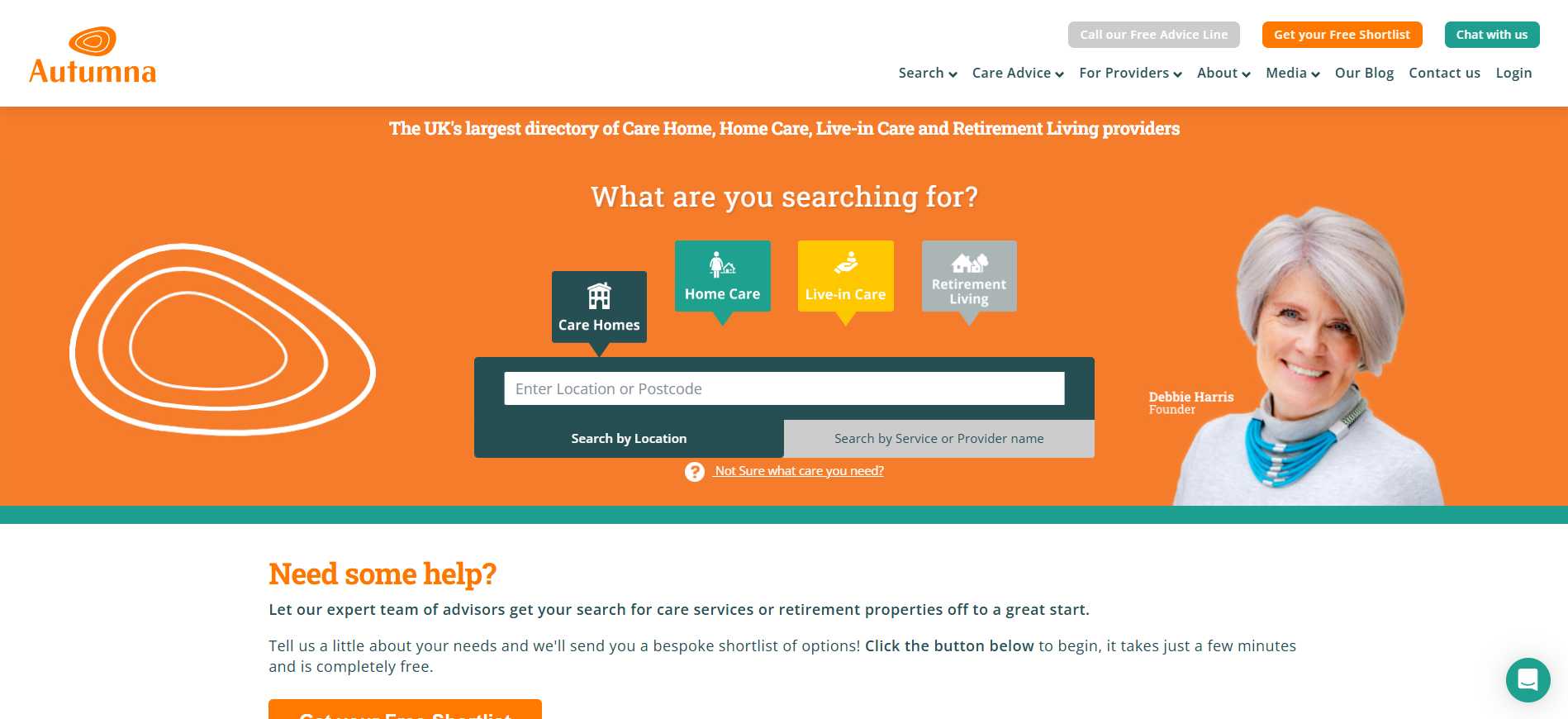
You will then be able to choose the Care Type, Availability, Price, and Additional Filters.
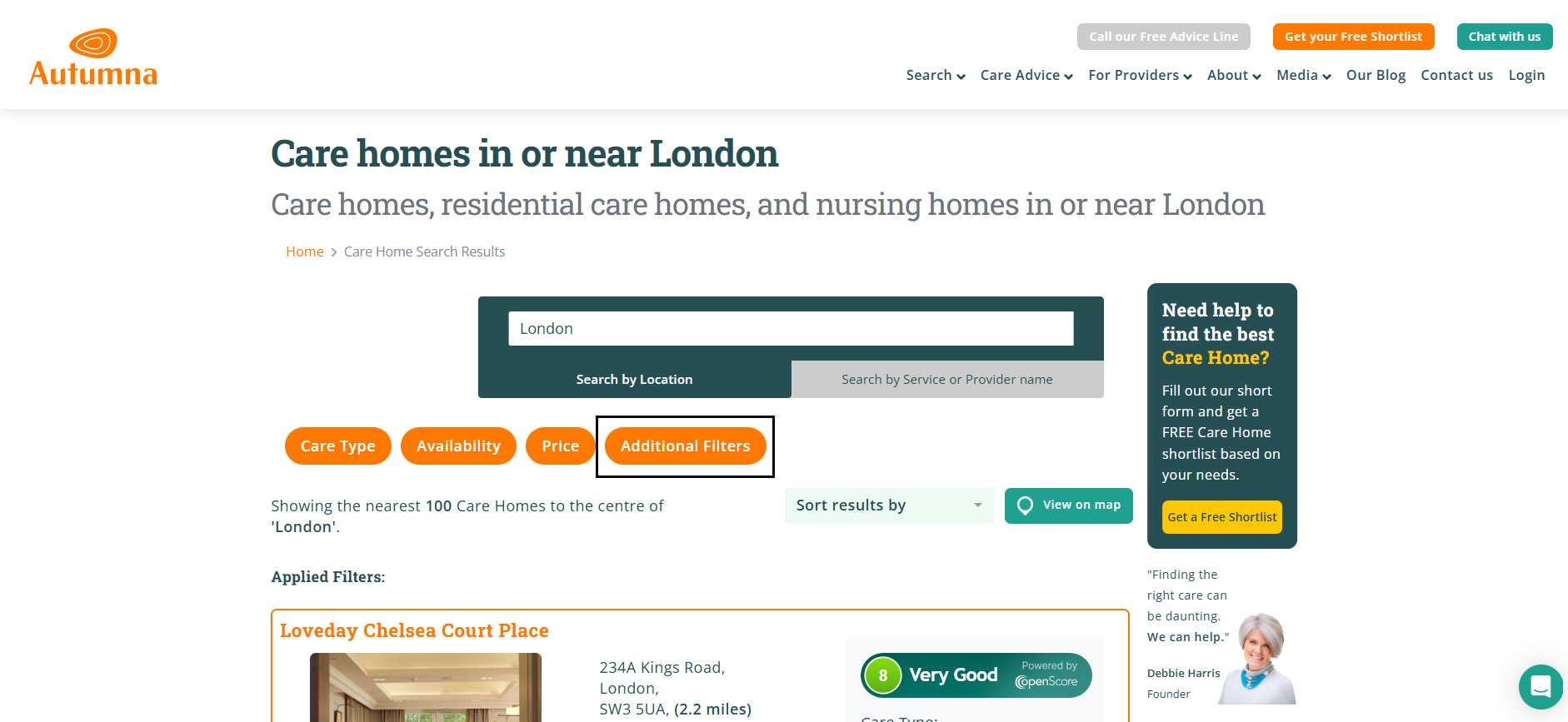
Under ‘Additional Filters’ you can search care homes for elderly couples by selecting Care Given.
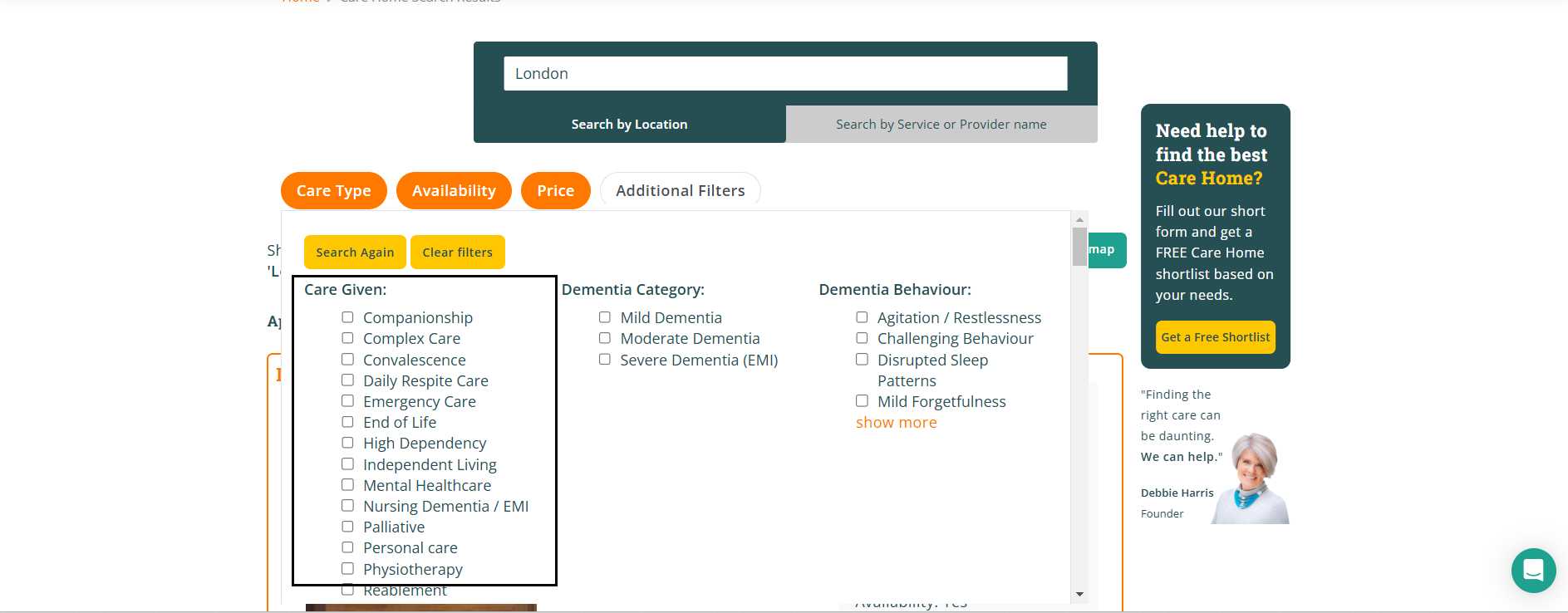
Click ‘Show more’ and scroll to the bottom. Check the box next to ‘Support for Couples’ and then click the yellow Search Again button at the top of the box.
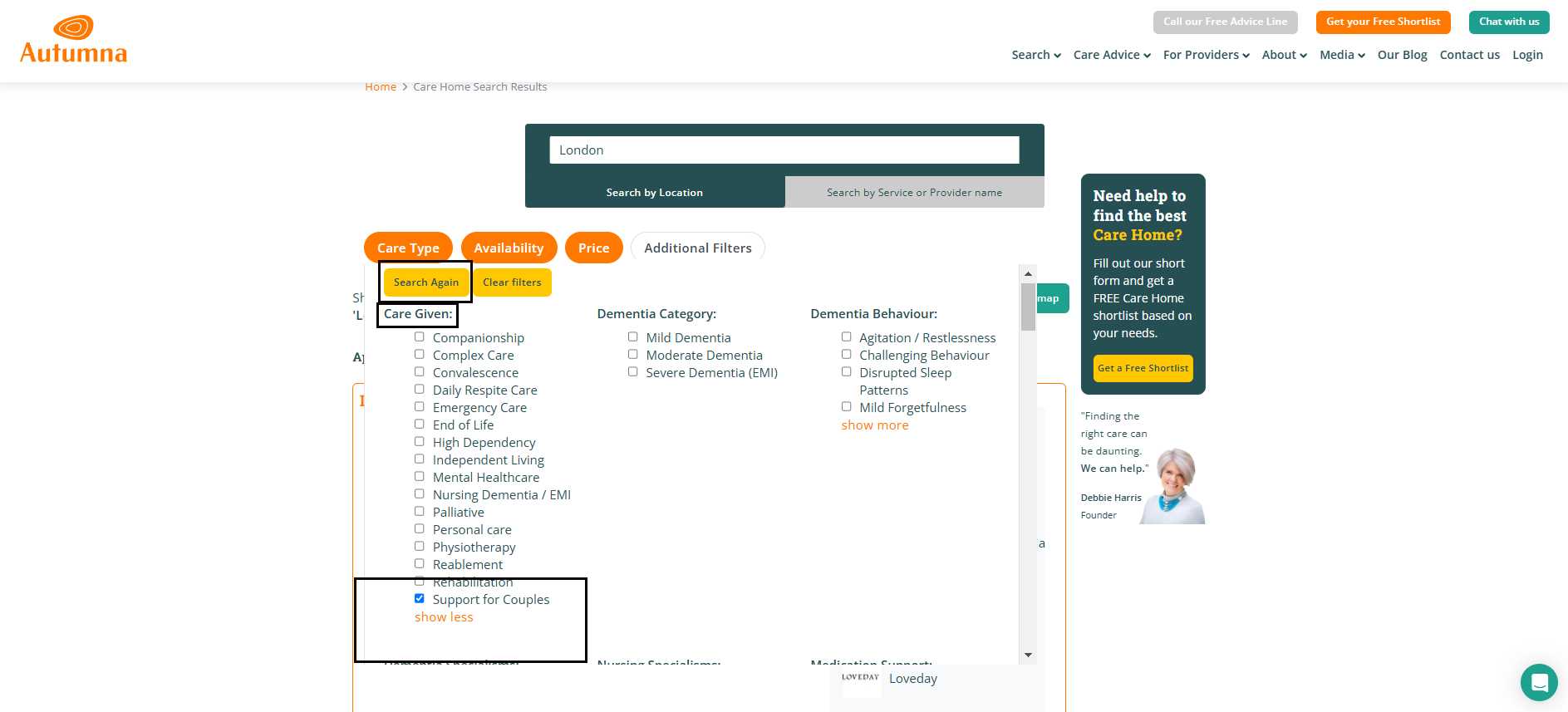
You will then be able to view a list of care homes in your chosen area that caters to couples.
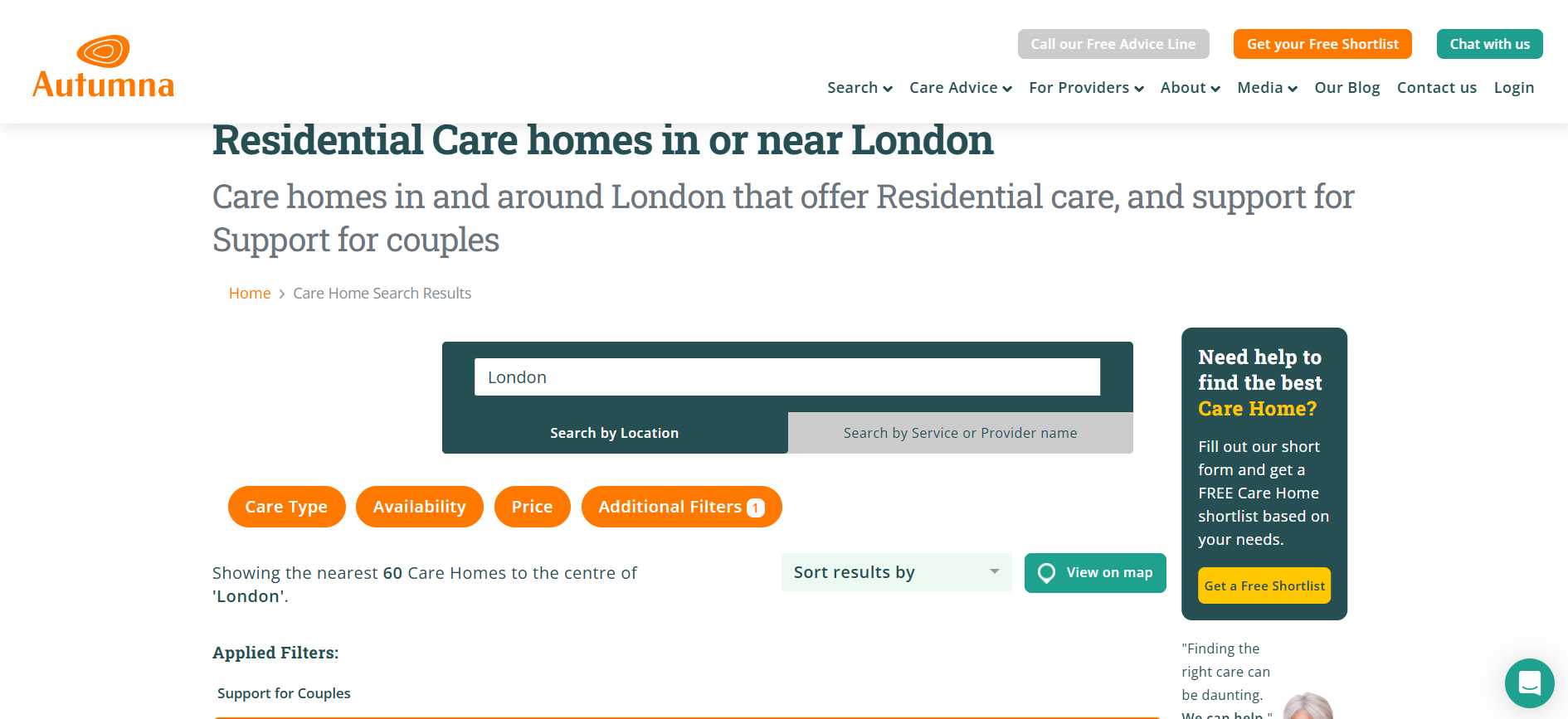
OpenScore: When searching for care homes on our website, you will notice a score at the top right of premium listings.
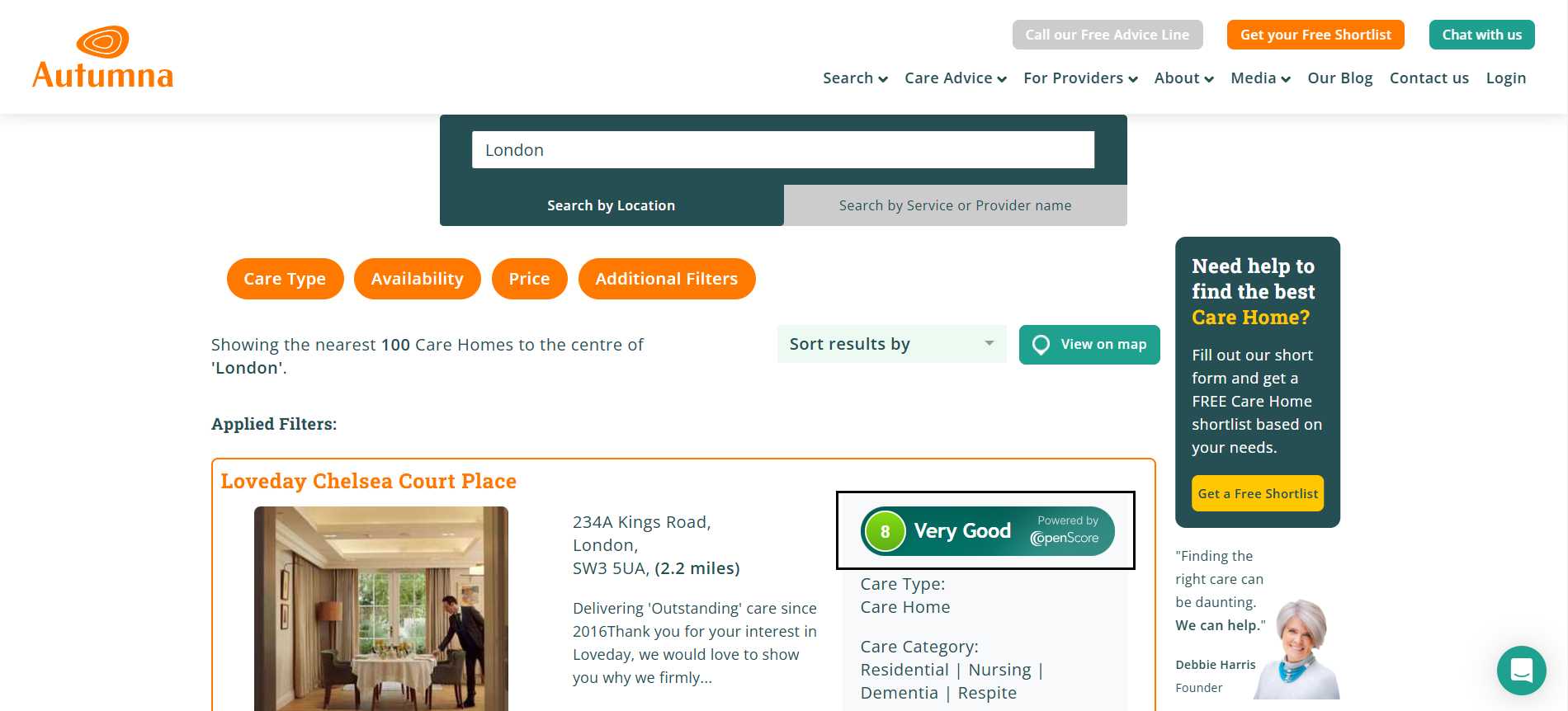
This OpenScore rating is an independent score out of 10 that is made up from multiple data sources aggregated in real-time. These sources include everything from dining choices, live reviews, cost transparency, data freshness and more. It is also the only rating system that covers the entire UK.
Care Quality Commission (CQC): The CQC ratings are well known across the health and social care sector. The best care homes according to the CQC receive an ‘Outstanding’ rating. However, it is important to note that the CQC only covers care homes in England and an independent review into the organisation revealed that its ratings were often out of date. So it is worth taking this into consideration when selecting a care home.
Contact care homes directly: Once you’ve narrowed down a list of potential care homes, reach out directly to enquire about accommodation options for couples, such as double rooms or adjoining suites. You can also request details directly from the care home itself, by clicking the ‘Request details’ button on the care home profile.
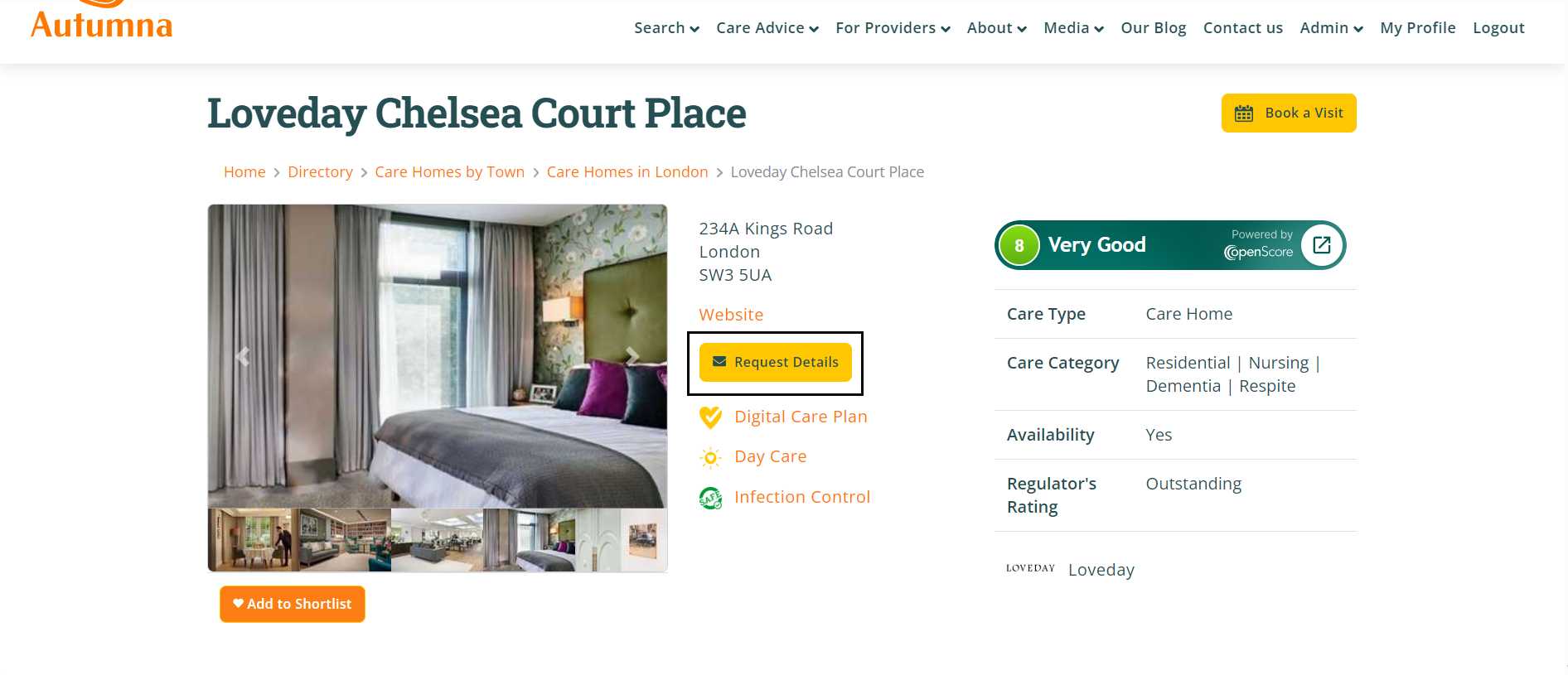
Confirm that the care home can provide personalised care plans for both partners, especially if their needs differ. If possible, visit the care home in question to get a better idea of its quality. You can do this by clicking the 'Book a Visit' button at the top right on the care home profile.
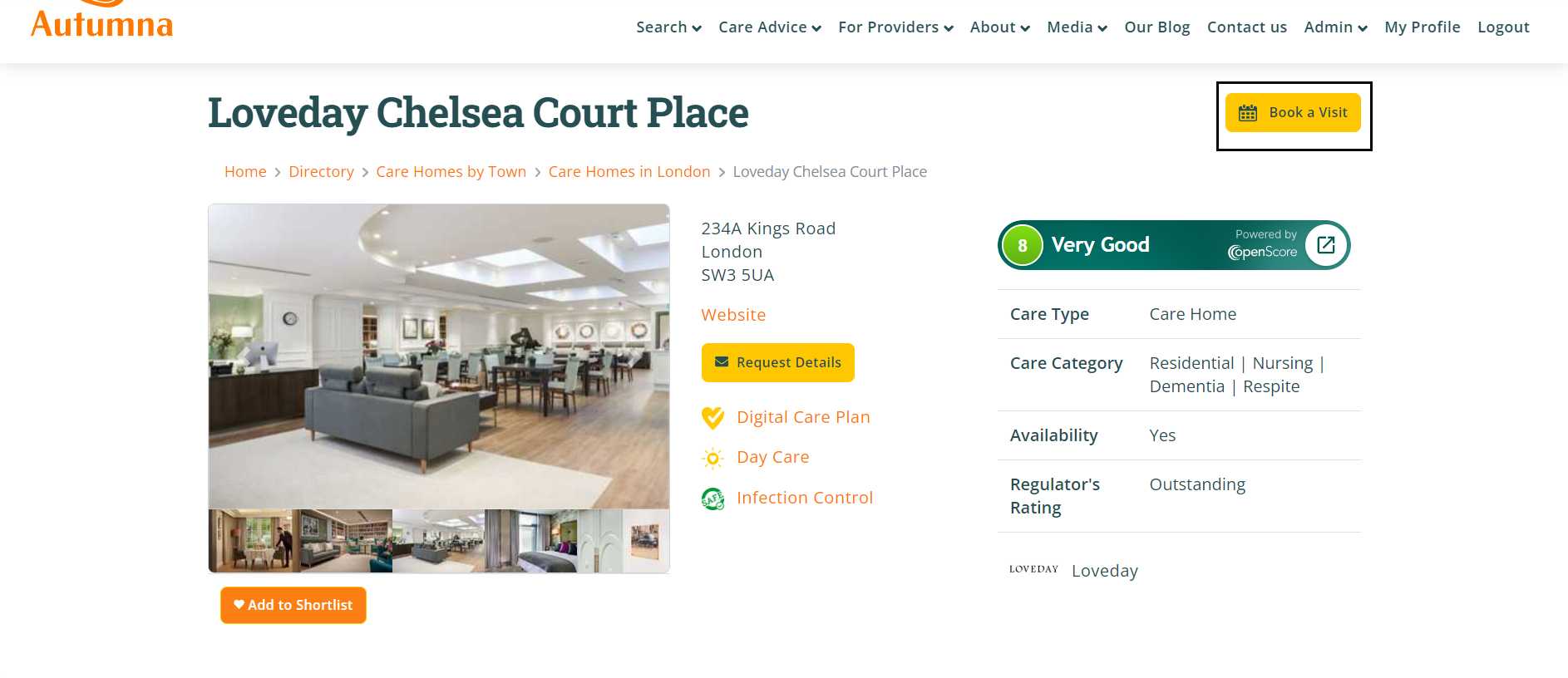
During your visit, get a feel for the atmosphere, speak with staff, and ask how couples are accommodated. Pay attention to the interactions between staff and residents to gauge the level of care and compassion.
Ask questions: When visiting care homes, it’s important to ask questions regarding pricing for couples, flexibility in care plans, and whether both partners can stay together if one’s care needs change over time. Clarifying these details upfront ensures that there are no surprises later in the process.
Considering budget and funding options
When planning a move to care homes for elderly couples, it’s essential to carefully consider your budget and explore funding options. Costs can vary significantly depending on each partner's care needs, as well as the type of accommodation and services provided. For example, if one partner requires nursing care while the other needs only basic support, fees may differ for each. Understanding how these costs will be calculated is crucial for financial planning.
Funding options for couples can include local authority support, which may help cover part of the costs if you meet certain eligibility criteria. This often depends on a financial assessment of your joint income and savings. For those who don’t qualify for local authority assistance, self-funding is an option, and some care homes offer flexible payment plans or joint pricing structures that can make it more affordable for couples to live together.
Seeking advice from financial advisers or care funding experts can provide clarity on the best options for your circumstances. They can guide you on matters like equity release, long-term care insurance, or tapping into savings to cover expenses. By carefully reviewing your budget and funding options, you can ensure a smoother transition into a care home that suits both partners’ needs.
Involving you both in the decision
When considering a move to a care home, it’s important that both of you are fully involved in the decision-making process. Your comfort, preferences, and agreement matter, and being part of the discussions can help ensure the move feels right for both of you.
Visiting care homes together can make a big difference. Seeing the environment firsthand, meeting the staff, and understanding how couples are accommodated can provide reassurance and help you feel more confident about the choice.
Take time to discuss what’s most important to you both—whether it’s staying close to family, enjoying social activities, or having a specific room arrangement. Sharing your thoughts will ensure the care home suits both your needs and preferences, making the transition smoother and more positive.
Bringing it all together
Finding the right care home for you and your partner doesn’t have to feel overwhelming. By following a few key steps, you can ensure the process is smooth and leads to a solution that keeps you both together while meeting your care needs.
Start by assessing your current and future care requirements. This will help identify what level of support each of you might need. From there, explore care home options that specialise in accommodating couples, and don’t hesitate to ask questions about how they personalise care for different needs.
Understanding costs and exploring available support, such as local authority funding or joint pricing plans, will also help you to make an informed decision. Throughout the process, involving both of you in discussions and visiting care homes together can provide reassurance and ensure the choice feels right for you both.
With thoughtful planning, you can find a care home that not only provides the care and support you need but also allows you to stay together and maintain your bond.
Find the right care home for you and your partner
Receive a Free Care Home Shortlist!
Let our expert team of advisers get your search off to a great start.
Tell us a little about your needs and we'll send you a bespoke shortlist of care homes! Click the button below to begin, it takes just a few minutes.
In addition to using Autumna’s online directory, you can also use our Shortlisting Tool. All you have to do is answer a few quick questions and you’ll be matched with a list of care homes that closely match your requirements.
You can also get in touch with our advisors on 01892 335 330 for more information.
Other articles to read
From the blog
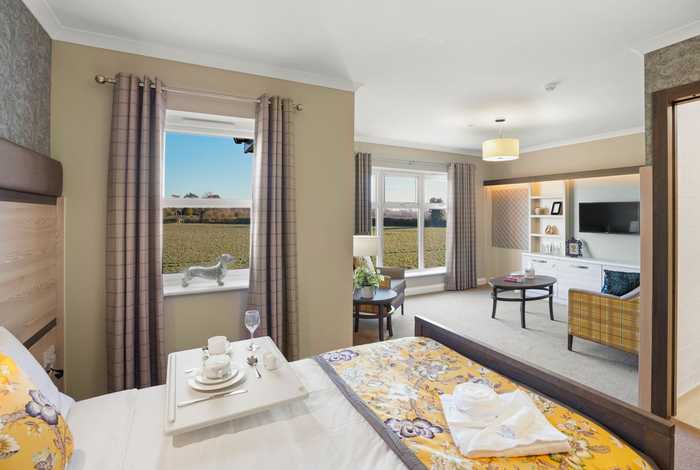
Older Persons Care Advice
Ultimate guide to care homes in Norwich
April 23rd, 2025
Discover the best care homes in Norwich—explore lifestyle-focused options, top-rated services, and how to choose the right home with confidence.

Older Persons Care Advice
How to find an adult day care centre near you
April 22nd, 2025
Looking for an adult day care centre near you? Discover how to find safe, joyful care for your loved one—and support for yourself—on Autumna.
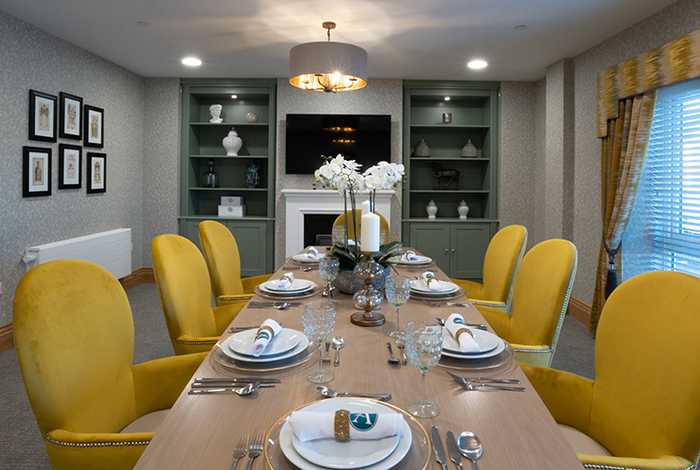
Older Persons Care Advice
How to shortlist care homes in Exeter
April 17th, 2025
Need help shortlisting care homes in Exeter? Learn how to filter options with confidence, compare homes, and find the best fit with Autumna’s free tools.
Frequently Asked Questions
Yes, many care homes offer personalised care plans for couples. Whether one partner requires nursing care or the other needs basic support, care homes often provide tailored solutions to ensure both partners’ needs are met.
Absolutely. Some care homes offer options like double rooms, private suites, or adjoining rooms, allowing couples to maintain their privacy and continue living together.
The most reliable way to assess care home quality is by reviewing its OpenScore rating at the top right of its profile. A score of 7 or above indicates a high quality care home, whereas a lower score suggests there is room for improvement. It is also important to schedule visits to potential care homes. Observing the environment, speaking to staff, and asking about their services can help ensure the home meets your expectations.
Many care homes offer a variety of activities designed to promote social interaction and wellbeing. Couples can enjoy meals, recreational activities, and even tailored events that enhance their quality of life. Check out our blog Top 10 popular activities for elderly people in care homes for more information. You can find it here: https://www.autumna.co.uk/blog/top-10-popular-activities-for-elderly-people-in-care-homes/
The UK's largest & most detailed directory of elderly care and retirement living options
10,445
Care Homes
12,390
Home Care Services
1,671
Live-in Care Services
1,826
Retirement Living Developments
Autumna is the UK's largest and most comprehensive later-life living & elderly care directory. Our detailed search facility and team of expert advisors can help you find the best care homes, nursing homes, retirement homes, retirement villages, home care, and live-in care services for you or your loved one's needs. Our website is free to use, we are proudly independent, and we never take referral fees.






